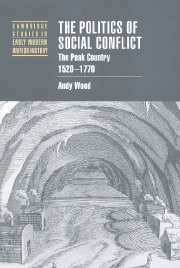Book contents
- Frontmatter
- Contents
- List of figures
- List of tables
- List of maps
- Preface
- List of abbreviations
- Introduction ‘Terms we did not understand’: landscape, place and perceptions
- 1 Social relations and popular culture in early modern England
- Part I The structures of inequality
- Part II The conditions of community
- Part III The politics of social conflict
- Bibliography
- Index
- Cambridge Studies in Early Modern British History
1 - Social relations and popular culture in early modern England
Published online by Cambridge University Press: 27 July 2009
- Frontmatter
- Contents
- List of figures
- List of tables
- List of maps
- Preface
- List of abbreviations
- Introduction ‘Terms we did not understand’: landscape, place and perceptions
- 1 Social relations and popular culture in early modern England
- Part I The structures of inequality
- Part II The conditions of community
- Part III The politics of social conflict
- Bibliography
- Index
- Cambridge Studies in Early Modern British History
Summary
CLASS AND SOCIAL HISTORY
Class, we are told, is dead. It has been excised from contemporary political discourse, and is being torn from its place at the heart of the social history of modern Britain. For many observers, rapid deindustrialization and the decline of mass society have removed the structural context within which class identities thrived. Shorn of Marxist certainties, social historians of modern Britain have come under the influence of new postmodern sociologies. Whereas Marxian social history had perceived of class as an embedded, material fact produced out of exploitation, immiseration and resistance, for their postmodernist successors class exists nowhere but in discourse. Earlier histories which saw working-class identity as a social fact born within the cradle of the early factory system and given voice in political radicalism and organized labour are now disparaged. Instead, class is seen as ‘an imagined form, not something given in a “real” world beyond this form’. To the postmodern historian, the force possessed by class in the nineteenth century came from its wide acceptance as a material fact, yet its only reality lay in discourse. Hence the language of class is seen as having provided momentary expression to the social opposition imagined by socialists and radicals. That language enabled socialists of the late nineteenth and early twentieth centuries to construct universal claims to political and economic equality. Postmodernist historians of the industrial period now reveal that universalism to have been a mere discursive tissue which covered over differences of gender, ethnicity, locality and religion.
- Type
- Chapter
- Information
- The Politics of Social ConflictThe Peak Country, 1520–1770, pp. 10 - 38Publisher: Cambridge University PressPrint publication year: 1999



